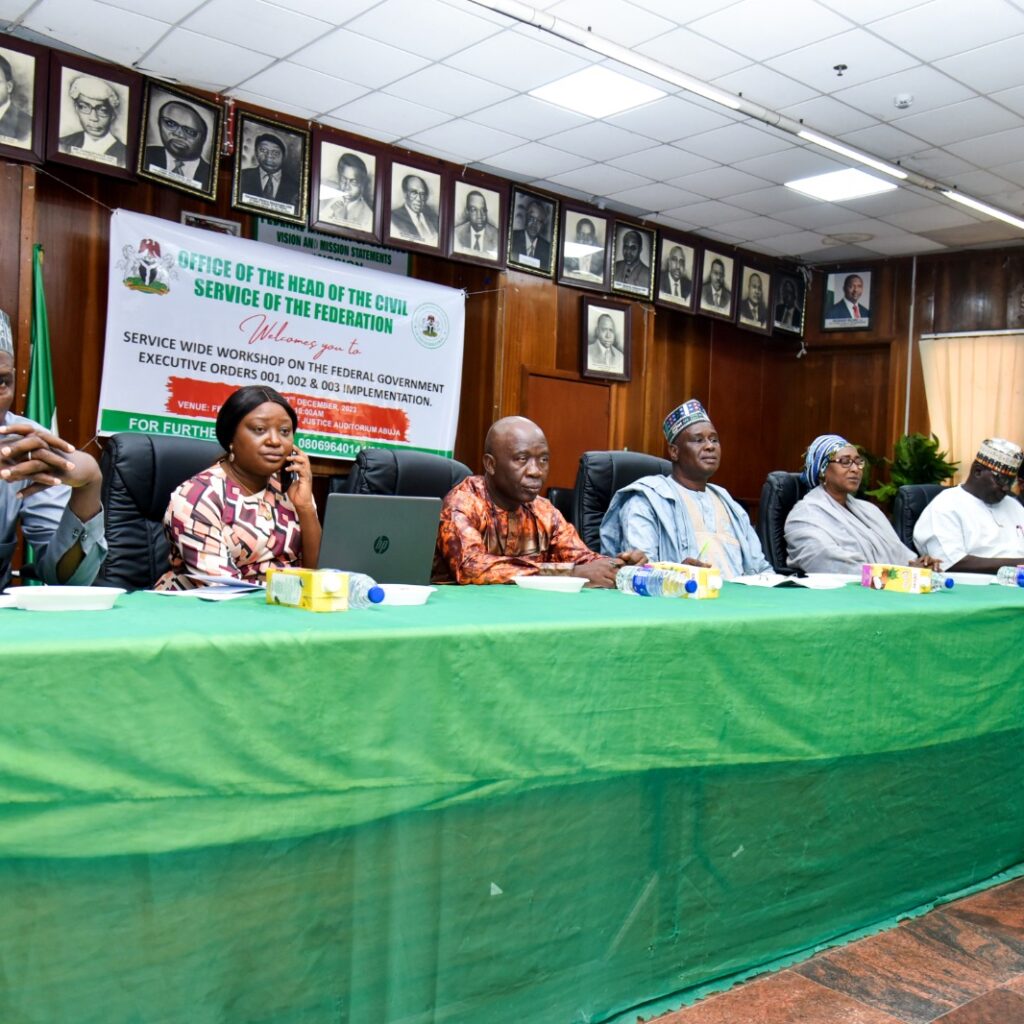
The Federal Government has vowed to continue creating enabling environment for businesses to thrive by issuing Executive Orders 001, 002 and 003 to Ministries, Departments and Agencies, MDAs, to promote transparency and efficiency in the Nigerian business environment.
The Permanent Secretary, Special Duties Office, SDO, in the Office of Head of Civil Service of the Federation, OHCSF, Engr. Faruk Yusuf Yabo, represented by the Director, Service Delivery, OHCSF, Mal. Mohammed Musa, revealed this at a Workshop on the Implementation of Executive Orders, E.O., 001, 002 and 003 for Heads of Servicom Units, Service wide, on Wednesday, December 27, 2023, in Abuja.
Yabo disclosed that on 18th May, 2017 the then Acting President of Nigeria, Prof. Yemi Osinbajo, SAN, issued EOs 001, 002 and 003 to MDAs to promote transparency and efficiency in Nigeria’s business and ensure effective budget implementation, as well as support local content in public procurement.
He noted that the implementation of these orders is of strategic importance to the Federal Government as the country seeks to create an enabling environment for businesses; promote transparency and efficiency; promote economic diversification; promote local industries and stimulate the growth of the national economy.
To achieve the objectives, the Permanent Secretary buttressed that all MDAs were directed to adhere strictly to the provisions of the Executive Orders as contained in the Guidelines for Implementation and that the Orders specified various deadlines for implementation.
He added that MDAs are also expected to make timely returns to the Office of the Secretary to the Government of the Federation, OSGF, and the OHCSF, as it affects the functions of their respective organisations.
Yabo stated that in order to drive the implementation and operationalisation of the E01 by Ministries, the Head of Service of the Federation, HoSF, and the then Acting Secretary to the Government of the Federation, SGF, were directed by the Acting President to organize training workshops for the various officer cadres, starting with Head of Agencies.
He noted that sequel to the circulars issued by the OHCSF and the OSGF and the Inaugural Workshop held on 30th May, 2017, MDAs were mandated to submit their Operationalisation Plans (OP) to the two Offices.
According to him, MDAs that are yet to comply with the content of the circular are expected to do so, urgently, adding that Permanent Secretaries and Heads of Agencies requiring workshops should liaise with their executing team to organise such, in clusters.
Yabo opined that the Enabling Business Environment Secretariat (EBES) will patronise the MDAs currently related to the work of the Presidential Enabling Business Council (PEBEC) and the Bureau for Public Service Reforms (BPSR) will also assist EBES in its facilitation.
He stated that prior to the workshops, MDAs are required to submit their OPs to the OHCSF, the OSGF and EBES, at least one week ahead, to enable the review of the documents, which should consist of the following: Service Level Agreements; Customer Interface Mechanism and Communication Strategy.
He stressed that in collaboration with the EBES and the Federal Government’s Service Compact (SERVICOM) team, the OHCSF and the OSGF will track and rank MDAs on their levels of E01 compliance.
In a presentation delivered by the Senior Reform Leader, Presidential
Enabling Business Environment Council (PEBEC), Mrs Aimeya Okpebholo, she dwelt on Executive Order 001, hinting that the promotion of transparency and efficiency in the business environment gave full executive support for the reforms at the federal level.
She also highlighted the six Directives of the Executive Order, which include transparency, default approval, port operations, registration of businesses, entry and experience of visitors and travellers.
She further stated that the reason for the inclusion of provisions in the Business Facilitation Act 2022 was not only to address business environment issues but to also promote global best practices, reduce cost, improve transparency and reduce time for completion of regulatory processes.
In another presentation, Alhaji Madu Uba, a Research Fellow at the Public Service Institute of Nigeria (PSIN), took the audience through Executive Orders 002 and 003.
He revealed that an Executive Order is a directive issued by the President that manages operations of the Federal Government and has the force of law.
He talked about the Executive Order, which stated that made in Nigeria products shall be given preference in the procurement of certain items and at least 40 per cent of the procurement expenditure on these items in all MDAs of the Federal Government shall be locally manufactured goods or local service provider.
The items, according to him, include Uniforms and Footwear, Food and Beverages, Furniture and Fittings, Stationeries, Motor Vehicles, Pharmaceuticals, Construction Materials and Information and Communication Technology.


